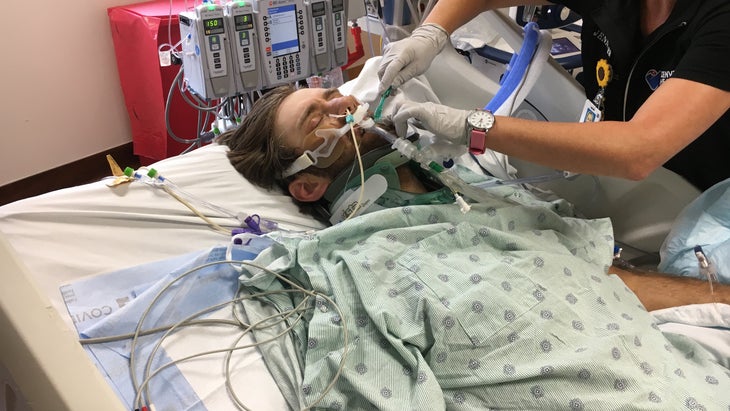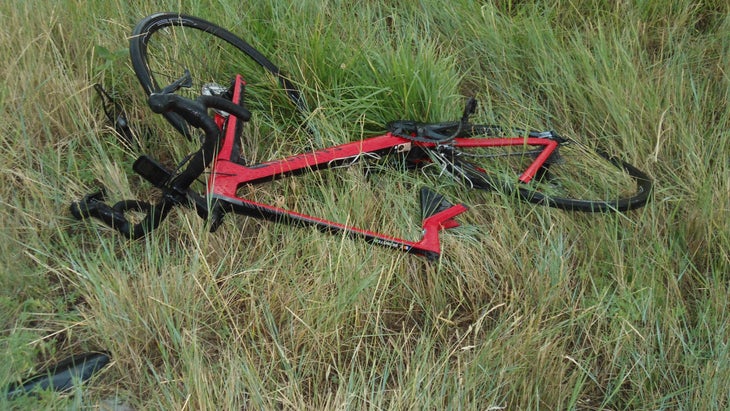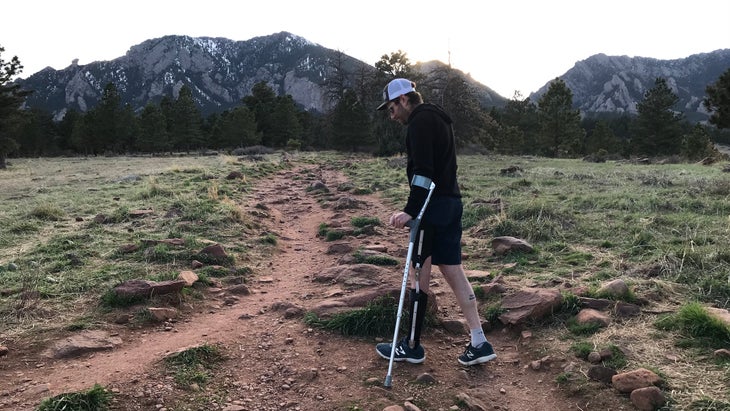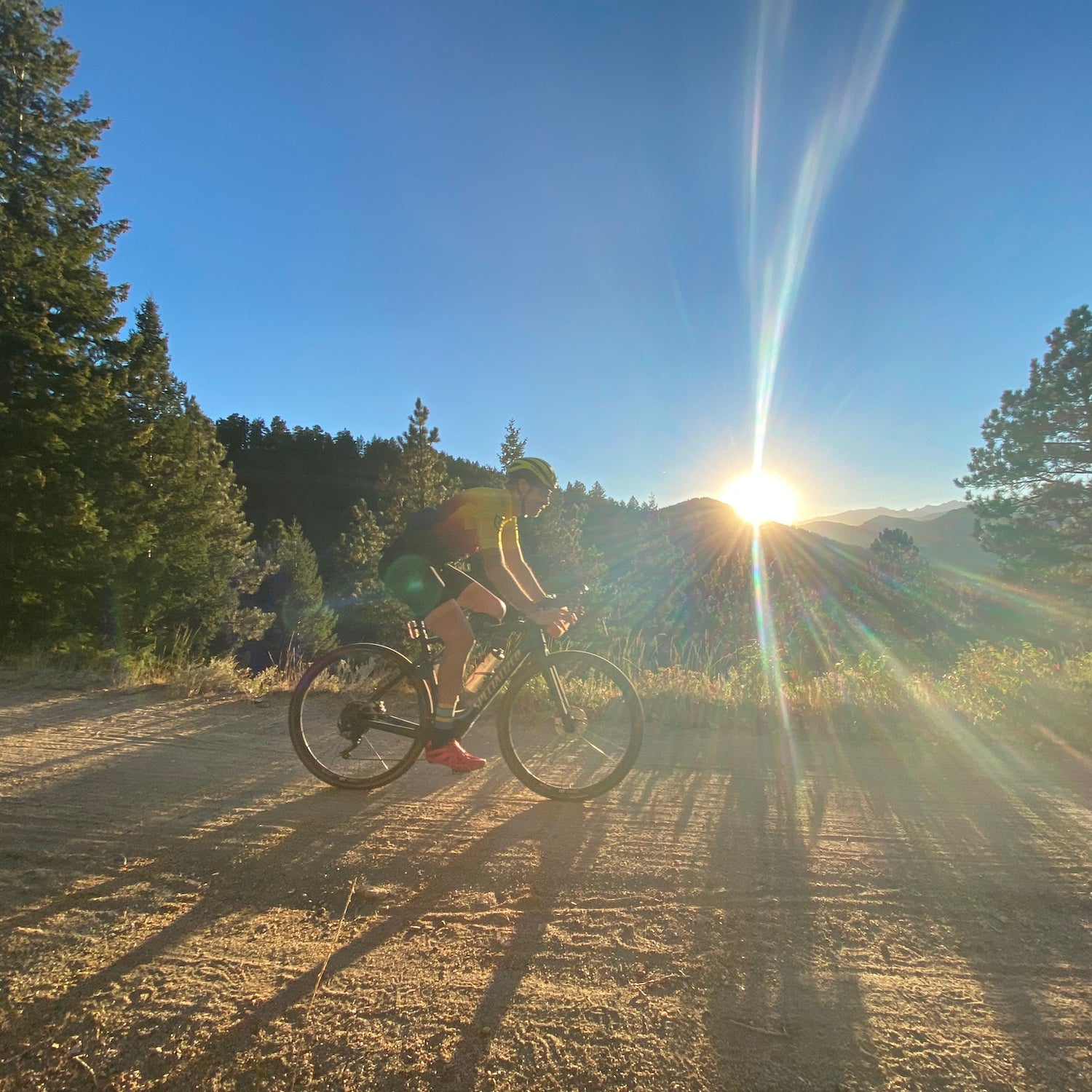I’d rehearsed the speech several times the night before, but the judge still had to ask me to slow down as I read my statement. As I addressed the court, the driver who hit me more than two years prior wasn’t in my field of vision, but I could still feel him off to my left and I wondered if my words would impact him, or anyone. I wondered if friends and supporters watching the proceedings via video feed would be able to see both of us at the same time. I wondered if the few friends I’d asked to attend in person could see how much my hands were shaking.
In July 2019, on an unusually gloomy afternoon in Boulder, Colorado, the assailant drove his old van into me. The driver fled and left me in a roadside ditch with injuries so severe that I very nearly died: internal bleeding, collapsed lungs, 35 broken bones, a concussion, and a spinal-cord injury that paralyzed my left leg and some organs. By grit and luck—or maybe due to a higher power—I became a rare example of what happens when a van smashes into a cyclist and somehow doesn’t cause death.
I’ve been emotionally unprepared for everything that’s happened since that day and therefore shouldn’t have been surprised by the feelings I experienced when, after nearly two and a half years, I confronted my attacker in court. But I turned out to be unprepared for that moment, too.
With relative speed, police located the vehicle and impounded it, but the van’s owner denied knowledge of a crash. He also obstinately refused to explain how pieces of his turn signal ended up at the crash site, or to provide any explanation about who was driving, if not him. The police finally issued an arrest warrant on November 9, 2020, but there was no immediate arrest and no meaningful update.
At some point during the process, I lost hope for any kind of justice and became resigned that this would be yet another driver to deal mortal wounds to a cyclist and get away with it. And that I’d be stuck paying for the results of his destructive behavior in the form of never-ending medical bills that arrive at my home.

I stopped sending periodic queries to the Boulder district attorney and focused on things I could control. Just as I had once dedicated myself to the training that let me compete in elite-level track racing—international races and national championship events—I now diligently worked on improving my physical condition, limited though it was. I went to various kinds of physical therapy as many as eight times a week and sought out doctors to help me relieve the chronic pain resulting from my lopsided paraplegia. (Today I’ve made progress but still dream of being pain-free.) I bought an e-gravel bike and went on rides that were once routine but felt novel after months of being forced to stick to flat paths. I walked so much that I, without any sensation in one foot, gave myself a stress fracture in the calcaneus bone, my first major setback in the process of recovery. Still, I trained all summer to hike my first fourteener, and in September, I reached the summit of 14,065-foot Mount Bierstadt.
I wondered if he thought he would get away with the crime.
Six more months passed before the driver was pulled over—by chance—on June 19, 2021, for an unrelated traffic violation and taken into custody. Without ceremony, the DA’s office emailed to say he’d been arrested.
He appeared in court the following week for a procedural check-in that I watched via video conference. He looked exactly as I’d pictured him: middle-aged, white, with a paunch and graying stubble that spread over world-weary wrinkles. He looked very serious, staring intently at the camera, his eyes glassy and unblinking as the judge worked through a number of other cases. I wondered if he thought he would get away with the crime. Or if he truly believed he hadn’t done anything wrong. Of course, he wasn’t called on to speak, so I continued to wonder.
With the DA’s office, I discussed the charges against him, the possibility of trial, the possibility of a plea deal, and various options for punishment. When asked, I said I hoped he’d never be able to drive again. And I asserted that he should bear full and ongoing financial responsibility for my care, though I knew financial remuneration is usually part of a civil action and one that I almost certainly wouldn’t pursue—this was a man without insurance and without resources worth trying to sue for.
The punishment of not driving was not an option available to the court, given the specific charges the driver pleaded guilty to: leaving the scene of an accident, careless driving, and criminal attempt to leave the scene of an accident. The disciplinary actions that were available ranged from restorative justice—speaking to teenagers about safe driving or some such thing—to prison.
After a couple months of deliberation, during which I voiced my wishes, which varied from day to day, the DA made him an offer: plead guilty to reduced charges and accept a sentence of two years in prison, plus parole and restitution, which everyone agreed I was unlikely to receive. His lawyer signaled that the deal was preferable to a trial, and the court set a date for arraignment.
I wasn’t required to address the court before his formal sentencing. In fact my attorney advised against it, telling me that most of his clients come away disappointed to see how little impact their words have. Despite his advice, I planned to speak, knowing that the driver would receive a previously agreed-upon sentence. I would expect nothing from the court but still wanted to state on the record, and for the larger public, how much this criminal had taken from me.
He will be out of prison long before my life sentence ends.
I arrived in court, in person this time, on October 22, 2021. I read remarks to the presiding judge, describing my initial trauma, the physical pain I live with, and other chronic symptoms of my spinal-cord injury—permanent paralysis of one leg, my bladder, bowel, and sexual function—the cost of managing it all, and also my conviction that there wasn’t much justice happening that day.
The driver, who spent two and a half years on the lam, was then given the opportunity to speak, and he shuffled to the lectern. “I’m sorry to everybody that’s involved in this incident. I’m taking full responsibility for this action, and I would like to apologize to Andrew,” he stammered before stepping away. I had no expectations for him either, of course, but his few words failed to reckon with any of my experience: the way he tortured my loved ones while I struggled to cling to life in the early days, or the harm he’d caused me physically and emotionally. He didn’t attempt to offer an explanation for fleeing or lying to law enforcement. He sat down in the empty jury box to await the sheriff’s deputies, who would take him into custody.
I took a little comfort in the judge’s agreement with my most important point: that a sentence of two years in prison and parole doesn’t help me and does nothing to prevent him from driving into someone else when he gets out. She agreed that he will be out of prison long before my life sentence ends.

The gavel came down, and I left to get drunk.
I don’t know what I expected from the arraignment, but I felt very raw after court. A friend visiting from out of state observed that most of the people we talked to about the proceedings over the next several days projected the same set of feelings onto me: they said things like “It must be such a relief to have this behind you!” or “Isn’t it nice to have some closure?” or “It’s not enough, but aren’t you happy he’s going to jail?”
I felt none of those things.
I can only hope that when he does drive again, he doesn’t crash into another person. If he does, it will be entirely because the justice system was unable to keep him off the road.
I felt sad. I felt angrier than I had in months, and not at the driver, oddly, but at the criminal justice system’s utter inability to mete out just punishment. Most of all, I felt hopeless in the face of the huge bills related to my rehabilitation—approaching $20,000 per year, after my health insurance’s contributions, for each of the last two years and with no indication of receding—now knowing with some certainty that I’d gotten all the help I was going to get. It’s a lot to be 37 years old, looking ahead to another 60 or 70 years of life, knowing that my ability to take care of myself will depend on my ability to stay in high-paying jobs that offer good private health insurance.
Worst of all, while so many around me seemed glad that there was some punishment—a prison sentence at that!—for a driver who hit a cyclist when so many are let off without consequence, I kept thinking about how nothing had changed for me. I was just as paralyzed as I was the day before the arraignment, my hopes for full recovery just as dim, and my needs just as great.
I did my best to take these comments as misguided well-wishes. But my inner New Yorker finally broke free when someone remarked, “You must be happy it’s all over.”
“It’s not over, and I don’t have anything to be happy about,” I said.
It wasn’t kindly put, but it is my truth.

The only fitting punishment for a person who’s shown such little interest in being a safe driver is to take them off the road forever, which I stated in court. But in this country, we give such priority to cars that a punishment of that nature is deemed unthinkably severe. Therefore, the best solution our society has is to put him in jail. He will likely be able to drive again soon after his release, and I can only hope that when he does drive again, he doesn’t crash into another person. If he does, it will be entirely because the justice system was unable to keep him off the road.
Early in this ordeal, I was predisposed to find a way to forgive this person. But with all that I’ve lost, how can I forgive someone who doesn’t acknowledge their actions, even as they plead guilty?
And how will his incarceration restore function to my body? How will his time in prison improve my situation in any way at all?
Of course, it will not.
In surviving this assault, I’ve been given a life sentence, and his two-year sentence will be a lot shorter. The unfairness is something that I will have to learn to accept. I’ll also learn to live with the discomfort I feel toward the justice system. Maybe I’ll forgive my attacker once that work is done. Or maybe not.


